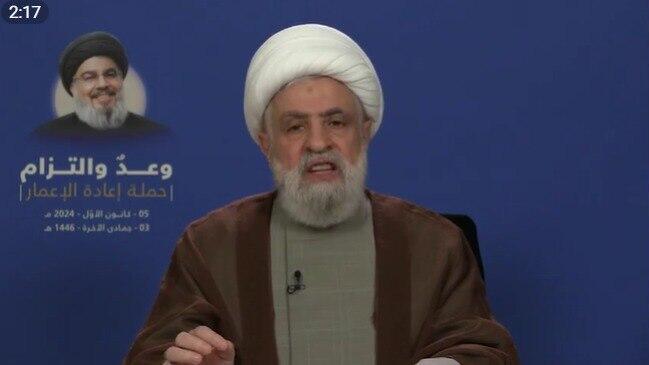On December 5, Hezbollah's Secretary-General Naim Qassem delivered a relatively brief televised speech lasting about half an hour that was meant to give hope to the average Lebanese citizen suffering from the lastest war with Israel.
Behind him, on a blue backdrop, was a portrait of the terror group’s former leader Hassan Nasrallah, accompanied by the slogan "Promise and Commitment - The Reconstruction Campaign," a campaign aimed at assisting Lebanese residents whose homes were destroyed by Israeli airstrikes.
Hezbollah distributing funds to Lebanese residents
During the speech, which followed the implementation of the cease-fire on the Lebanon border, Qassem expressed gratitude to those who hosted displaced Lebanese individuals during the conflict and to various parties that supported the government and citizens.
"We thank Iran, under [Ali] Khamenei's leadership, its government, its people and the Iranian Revolutionary Guard Corps (IRGC) for providing this generous aid," he said.
He announced Hezbollah's decision to grant displaced families financial aid ranging between $300 and $400 and elaborated on the reconstruction campaign.
"If a home was completely destroyed and served as the primary residence, the owner will receive $8,000 for furnishing a new home and $6,000 for one year's rent if they reside in Beirut or the Dahieh district. Outside Beirut, the rental aid amounts to $4,000 annually."
Qassem thanked Tehran, "as most of this funding was provided by them," as well as support from Iraq and Yemen. He called on "Arab brothers and friendly countries to assist in the reconstruction." According to a Lebanese report, however, only Iran appeared to have answered his call.
Lebanese outlet Al-Diyar reported on Wednesday that Lebanon's Prime Minister Najib Mikati informed the U.S. Ambassador to Lebanon Dorothy Shea that Iran was the only country offering reconstruction aid.
According to the report, he advised the ambassador not to obstruct the process, asserting that the funds would reach Hezbollah via other channels if they weren't processed by the state. Shea reportedly promised to present the matter to American officials.
In recent months, numerous reports have surfaced about aid shipments arriving in Lebanon from various countries, though these don’t appear to involve reconstruction efforts. It seems that Iran, despite its own need for donations, is the primary donor to the reconstruction efforts which Hezbollah officials claim are progressing.
Diplomats commented on the reconstruction issue, telling Lebanon's Al-Jadeed outlet that Arab countries including Saudi Arabia have expressed interest in aiding reconstruction efforts but won’t transfer funds without oversight or control.
Hezbollah's Deputy Executive Council Chair Ali Daamoush addressed the stages of the reconstruction campaign this week, saying: "The secretary-general established a committee tasked with supervising the reconstruction.”
"Technical teams are conducting surveys in affected areas, prioritizing families whose homes were completely or partially destroyed and allowing them to return as quickly as possible,” he added. “To our people along the border, we say: We will rebuild the villages. Aid will promptly reach everyone in need."
"I assure the people that the funds for the reconstruction are secured,” he promised. “Misleading campaigns will not shake public trust in the resistance — the funding is guaranteed by the Iranian people, who extended a helping hand to the Lebanese people. Thanks to Khamenei for his love and affection for Lebanon. Thanks to Iran, its citizens and its leadership, as well as to Iraq's leadership and people and to all nations willing to assist in reconstruction.”
“The project has begun and we will complete it. We’ll return to our homes with our heads held high. We’re demonstrating the victory of reconstruction over destruction and the triumph of resistance over aggression. Those who doubted Hezbollah's ability to compensate the victims were mistaken,” he concluded.
Hezbollah's Deputy Political Council Chair Mahmoud Komati also addressed the reconstruction campaign this week, stressing the terror organization's dedication to it. "There are red lines we won’t allow to be crossed, including the resistance's weapons, finances, reconstruction and shelter," he said.
"We don't want the help of anyone offering aid to Lebanon with conditions that affect the resistance. The residents of southern Lebanon will return to their homes and no one will stop them. We pledged patience for 60 days. The 61st day will be different,” he warned. “The situation will change, existing forces will be treated as occupiers and we will address them accordingly."
Hezbollah-affiliated Lebanese outlet Al-Manar has been covering the reconstruction campaign extensively, documenting the distribution of funds and providing updates on its progress. Over the weekend, the channel's website reported that Hezbollah's real estate organization, Jihad al-Binaa ("Jihad of Construction"), identified 185,000 damaged housing units.
"The Jihad al-Binaa Development Fund, in line with Hezbollah and Nasrallah's promise, continued its efforts to identify structures damaged by Israeli aggression through its teams, swiftly working to restore residents to their homes," the report read. An accompanying graphic shared on the channel's X account detailed the affected buildings' locations.
Get the Ynetnews app on your smartphone: Google Play: https://bit.ly/4eJ37pE | Apple App Store: https://bit.ly/3ZL7iNv
Even before Naim Qassem's speech earlier this month, the UK-based Saudi newspaper Asharq al-Awsat reported on Iranian support for reconstruction. The report mentioned the reopening of Hezbollah's bank, Al-Qard al-Hassan, while a Hezbollah source clarified that reconstruction and housing subsidies would not come from the bank's funds, but from Iranian money recently delivered to Hezbollah.
According to the source, Iran transferred $1 billion to Hezbollah via a regional state on the first day of the cease-fire with Israel, which then began assessing damages in preparation for compensation payments.








